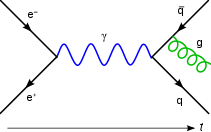
Back نظرية المقياس الشبكي Arabic Gittereichtheorie German Théorie de jauge sur réseau French Teoria di gauge su reticolo Italian 格子ゲージ理論 Japanese 격자 게이지 이론 Korean Teorias de gauge na rede Portuguese
| Quantum field theory |
|---|
 |
| History |
In physics, lattice gauge theory is the study of gauge theories on a spacetime that has been discretized into a lattice.
Gauge theories are important in particle physics, and include the prevailing theories of elementary particles: quantum electrodynamics, quantum chromodynamics (QCD) and particle physics' Standard Model. Non-perturbative gauge theory calculations in continuous spacetime formally involve evaluating an infinite-dimensional path integral, which is computationally intractable. By working on a discrete spacetime, the path integral becomes finite-dimensional, and can be evaluated by stochastic simulation techniques such as the Monte Carlo method. When the size of the lattice is taken infinitely large and its sites infinitesimally close to each other, the continuum gauge theory is recovered.[1]
- ^ Wilson, K. (1974). "Confinement of quarks". Physical Review D. 10 (8): 2445. Bibcode:1974PhRvD..10.2445W. doi:10.1103/PhysRevD.10.2445.